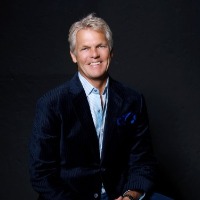Goalie Days by Dave LaRue

A goalie must have one overriding quality—
he must want to be a goalie.
- Emile Francis
Decisions have consequences. If we don’t make them for ourselves, who does? Some decisions are tougher than others. Some are subtle. Some are forced on you from the outside, and you can never be completely sure what the outcome will be. One of the most important decisions in my life happened right as I was becoming an adult, at that time in a person’s life when decisions set things into motion for the rest of their life. It was the crossroads where I first stepped onto the path I’m still on today, and where I first encountered “the path not taken” I had heard so much about.
When you’re good at something, it can be difficult to step back and realize that for all of your ability and success in that particular arena, it isn’t the right ability to build your life around. For me it was sports. I was good at sports, and they were instrumental for me in making it through my childhood; with all of the trouble I had at home, the sense of success that I was allowed to earn in sports, as well as the opportunity to be coached and led to an attitude of achievement, were priceless.
I was a good goalie. My high school hockey coach worked with me as much as he could, but at the end of the day I was a self-taught goalie, relying on my natural athleticism to make up for the gaps in my training. Apart from my coach, I was the only person motivating myself. My mother encouraged me, but she couldn’t help with the sports stuff. I didn’t have a dad that encouraged me or taught me anything—other than what not to do. I was trying to process life decisions on my own. I started with a bang as a tenth- grader on the varsity team and immediately got noticed. Then as a junior and senior some real opportunities were presented to me.
When Mel Pearson, a former player for the Minnesota Fighting Saints, became the coach and manager for the Flin Flon Bombers, he invited me to try out for the team. Flin Flon, Manitoba is 500 miles north of Winnipeg, which meant it was 1000 miles from my home in Minneapolis. I went up and competed against the best players I had ever shared the ice with. There were 114 players trying out, including 14 goalies. Of all the competitors, only two were American: myself and Rick, a hockey buddy of mine from Minnesota, a defenseman. The Canadian style of play was more competitive and aggressive than either of us was used to. I had to take it all in and rise to the occasion in order to hold my own. I was getting the hang of it and had started to earn the respect of the other competitors when, after about a week, Rick decided it wasn’t for him.
Two weeks later I was called into Mel’s office. They had cut the goalies down to just four, and they were going to make the final cuts. Mel said I was on the team if I wanted it, but he wanted me to think about it. So I went for a long walk to think by myself. I thought about it: being 1000 miles from home, playing hockey in this tiny town in Canada. I thought about the offers in front of me: The Bombers, The Olympics. I thought about what it would be like to live the lifestyle of an athlete. Then I thought about everything back in Minneapolis. I thought about family life, going to college, and starting a career. For all the excitement offered by the prospect of Pearson’s offer, there was something about it that I knew wasn’t for me. I decided to go back to Minneapolis, enroll in college, and marry my high school sweetheart.
Over the years I’ve thought about how I took the path I did, and what my life might look like had I chosen to stay in Manitoba to play hockey. It can get a little overwhelming when you think like that: What if the past had been different? I could imagine having gone all the way to the pros, eventually becoming a coach—or an owner of an NHL team. The possibilities were there once, and the fantasies are nice, but that’s all they are—the past wasn’t different, and I’m glad. What I see now is that I made the right decision.
I was good at hockey. Pearson’s invitation proved that. Moreover, sports had made me able to make it through my childhood, but they were not going to see me through the rest of my life. I wanted something else. I wasn’t sure at the time, but I realize now that this was the root of my reluctance to take the position on the team. Hockey, and sports in general, had served me well, but it was time to move on. I took the confidence that came from all the success and accomplishment I had earned and began my journey to discover who I really was, who I wanted to be, what my values were, and how to live the life I wanted to.
It’s another example of how a single decision can totally change your life. If I hadn’t gone back to Minneapolis, I wouldn’t have married the woman I did and I wouldn’t have the children I have. I wouldn’t be in the business I’m in. I wouldn’t have met many of the wonderful people that I have in my life now.
But I did, and I know what decisions got me here. I know which path I didn’t take, and I feel great about the path I did.
Can you remember experiences like this, where paths split in your life? Do you need to flip the way you look at some of your experiences so that you can enjoy where you are now, and create the path you want for the future?









